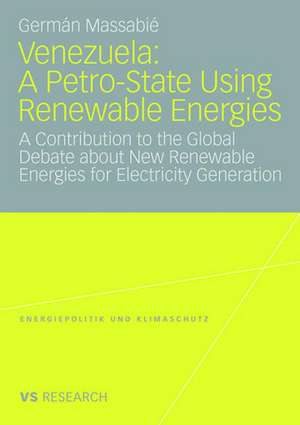Venezuela: A Petro-State Using Renewable Energies: A Contribution to the Global Debate about New Renewable Energies for Electricity Generation: Energiepolitik und Klimaschutz. Energy Policy and Climate Protection
Autor Germán Massabiéen Limba Engleză Paperback – 15 mai 2008
Din seria Energiepolitik und Klimaschutz. Energy Policy and Climate Protection
- 15%
 Preț: 484.12 lei
Preț: 484.12 lei -
 Preț: 352.25 lei
Preț: 352.25 lei -
 Preț: 347.25 lei
Preț: 347.25 lei -
 Preț: 391.02 lei
Preț: 391.02 lei -
 Preț: 278.64 lei
Preț: 278.64 lei -
 Preț: 461.50 lei
Preț: 461.50 lei -
 Preț: 318.29 lei
Preț: 318.29 lei -
 Preț: 420.58 lei
Preț: 420.58 lei -
 Preț: 430.79 lei
Preț: 430.79 lei -
 Preț: 463.41 lei
Preț: 463.41 lei -
 Preț: 388.90 lei
Preț: 388.90 lei - 15%
 Preț: 641.85 lei
Preț: 641.85 lei -
 Preț: 390.08 lei
Preț: 390.08 lei -
 Preț: 387.75 lei
Preț: 387.75 lei - 15%
 Preț: 515.30 lei
Preț: 515.30 lei -
 Preț: 420.97 lei
Preț: 420.97 lei -
 Preț: 483.55 lei
Preț: 483.55 lei - 15%
 Preț: 710.09 lei
Preț: 710.09 lei -
 Preț: 421.93 lei
Preț: 421.93 lei -
 Preț: 420.97 lei
Preț: 420.97 lei -
 Preț: 419.21 lei
Preț: 419.21 lei -
 Preț: 458.61 lei
Preț: 458.61 lei - 15%
 Preț: 534.17 lei
Preț: 534.17 lei -
 Preț: 387.38 lei
Preț: 387.38 lei -
 Preț: 382.57 lei
Preț: 382.57 lei - 15%
 Preț: 527.66 lei
Preț: 527.66 lei -
 Preț: 458.19 lei
Preț: 458.19 lei -
 Preț: 394.29 lei
Preț: 394.29 lei -
 Preț: 424.43 lei
Preț: 424.43 lei -
 Preț: 437.12 lei
Preț: 437.12 lei -
 Preț: 424.99 lei
Preț: 424.99 lei - 15%
 Preț: 583.45 lei
Preț: 583.45 lei - 15%
 Preț: 530.58 lei
Preț: 530.58 lei - 15%
 Preț: 522.10 lei
Preț: 522.10 lei - 15%
 Preț: 581.33 lei
Preț: 581.33 lei - 15%
 Preț: 521.60 lei
Preț: 521.60 lei - 15%
 Preț: 446.27 lei
Preț: 446.27 lei - 15%
 Preț: 586.23 lei
Preț: 586.23 lei - 15%
 Preț: 544.81 lei
Preț: 544.81 lei -
 Preț: 353.51 lei
Preț: 353.51 lei -
 Preț: 480.44 lei
Preț: 480.44 lei -
 Preț: 423.84 lei
Preț: 423.84 lei - 15%
 Preț: 447.25 lei
Preț: 447.25 lei -
 Preț: 358.20 lei
Preț: 358.20 lei -
 Preț: 366.67 lei
Preț: 366.67 lei
Preț: 385.47 lei
Nou
Puncte Express: 578
Preț estimativ în valută:
73.76€ • 77.23$ • 61.18£
73.76€ • 77.23$ • 61.18£
Carte tipărită la comandă
Livrare economică 09-23 aprilie
Preluare comenzi: 021 569.72.76
Specificații
ISBN-13: 9783531159942
ISBN-10: 3531159941
Pagini: 296
Ilustrații: XIX, 274 p.
Dimensiuni: 148 x 210 x 18 mm
Greutate: 0.35 kg
Ediția:2008
Editura: VS Verlag für Sozialwissenschaften
Colecția VS Verlag für Sozialwissenschaften
Seria Energiepolitik und Klimaschutz. Energy Policy and Climate Protection
Locul publicării:Wiesbaden, Germany
ISBN-10: 3531159941
Pagini: 296
Ilustrații: XIX, 274 p.
Dimensiuni: 148 x 210 x 18 mm
Greutate: 0.35 kg
Ediția:2008
Editura: VS Verlag für Sozialwissenschaften
Colecția VS Verlag für Sozialwissenschaften
Seria Energiepolitik und Klimaschutz. Energy Policy and Climate Protection
Locul publicării:Wiesbaden, Germany
Public țintă
ResearchCuprins
Rents and Petrostates.- Background: Electric Power System its Drivers and Major Trends.- Renewable Energy Sources (Basics).- Promotion of RETs: Policies for Overcoming Barriers.- Venezuela’s Electric Power Sector: Institutional Framework.- Venezuela’s Electric Power System: Historical Evolution and Present Status.- Renewable Energies in Venezuela.- Conclusions.
Notă biografică
Dr. Germán Massabié completed his doctoral studies under the supervision of PD Dr. Lutz Mez at the Freie Universität Berlin. He is a research assistant at the Environmental Policy Research Centre (FFU) at the Otto-Suhr-Institute for Political Science.
Textul de pe ultima copertă
In spite of the economic role of oil, Venezuela has started developing hydroelectricity since the 1950s. At present, the country is trying to introduce additional renewable energy sources (RES) but still has to overcome a series of hurdles in order to deploy them. Unlike other developing countries, oil countries such as Venezuela do not lack financial means and sometimes show a tendency to solve problems by using money when other approaches could be more helpful. The main goal of this qualitative, comparative policy analysis is to find out whether the availability of oil revenues restraints or favors the adoption of RES. Based on the rentier state theory, Germán Massabié examines the reasons why Petro states try to dispose of their natural wealth to take advantage of non-conventional energy sources. He analyses and interprets primary and secondary data collected in Germany and in Venezuela and draws on interviews with Venezuelan experts, policy makers, and key actors. The study allows a look beyond laws, development programs, and official statements.










